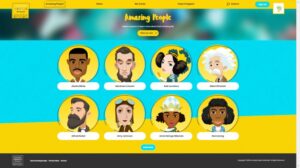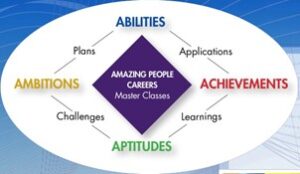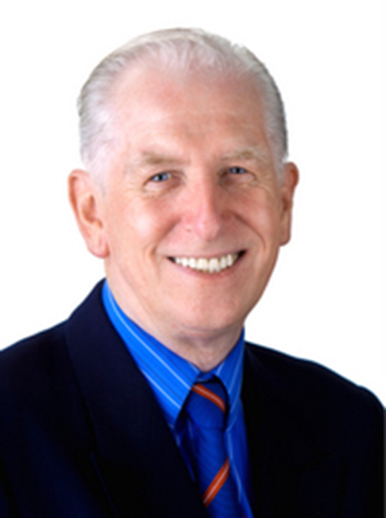Character, Citizenship and Confidence
By Dr Charles Margerison
Psychologist
Synopsis
The development of students depends upon their perception and experience combined with guidance from theory and knowledge. This article outlines some of the important ideas that have been researched over many generations. In particular, it outlines processes to help develop student confidence.
Attributions and Real Behaviours
 We often refer to a person being of good character. That is an attribution, which can mean the person is honest, works hard, has not been in trouble with the law, is helpful to others and is recognised in the community as someone who makes a contribution to others over time.
We often refer to a person being of good character. That is an attribution, which can mean the person is honest, works hard, has not been in trouble with the law, is helpful to others and is recognised in the community as someone who makes a contribution to others over time.
Is that what character education in schools should be about?
Others may say that character education is about identifying and developing one’s strengths and using those to the best advantage to be a winner rather than a loser in the competitive battlefield of life. In effect, it is real behaviours that count, not attributions. Darwin said that those who survive are effective at adapting to circumstances. That is a strong basis for character development.
Many studies have been made to identify key aspects of character with the aim of designing training and education to enable students to develop those behaviours. In addition, religious groups have defined behaviours they regard as essential to living a virtuous life.
Organisations like the Scouts develop criteria and practical exercises to guide their members. Military units around the world focus on character training by conditioning their troops to fight the enemy.
So, these religious, military and social organisations have developed structured experiences for socialising and controlling their members. But what should schools do? They can help students develop their confidence to behave in positive and effective ways. One approach that we have tried with success is called Amazing People Interviews.
Process
The process can work as follows:
- Teacher chooses a theme, such as courage.
- Examples of amazing people who exhibited courage are provided.
- Students are asked to gather information on someone who they think exhibited courage.
- Students are also asked to develop some questions to another student about when they have exhibited courage.
- The interviewer keeps notes and writes up the interview as a newspaper story on courage.
- Roles are then reversed, and the other person is interviewed, and the story is written.
- Both students also write up what they learned about their own character as a result of the interviews and assess their confidence in doing so.
Implications for Student Confidence and Self-Development
Character, citizenship, and confidence education requires an innovative approach from teachers. Indeed, the word teacher needs to be reviewed. You can teach someone mathematics or science, where you are imparting specific knowledge and techniques. But, the social factors associated with character education, such as confidence, require the skills of a facilitator, where the issues are more open-ended.
Their roles can be defined in two key areas of teaching/training and facilitating/coaching. Character, citizenship and confidence education focus more on the psychological needs of the students, in terms of their personalities and making the best of their opportunities. These areas deal with the issues of growing up, attitudes, ambitions, relationships, and the building of confidence.
Learning from Amazing People

My research has focused on the important issues that we can learn from amazing people who made major contributions. For example, Mozart dealt with such issues from a young age. A question he faced was how to make the most of his talent? That is a question every student can ask as part of character development.
Another example is that of a person who did not receive a formal education. It took Harriet Tubman a long time to escape from slavery, where her role and life was dominated and defined by the slave masters.
The essence of self-development and confidence is to enable students to become both independent and interdependent, so they can flourish. Learning with and from people who triumphed over adversity is a way to inspire students. They can then realise how others overcame problems. Elvis Presley, for example, had few friends at school because of a stammer. Thomas Edison, who founded the General Electric Company and registered 1093 patents, left formal schooling at the age of seven because he was profoundly deaf. He continued his schooling at home, where he was taught by his mother, until he went to work at the age of thirteen.
Theory and Evidence for Self-Development
Robert Merton(1) developed the self-fulfilling prophecy theory. He argued that in order to succeed on a regular basis, we need to have a firm belief in both the process and the result. In effect, people who write a positive script, and follow it, are more likely to succeed. That is at the heart of confidence building.
Albert Bandura(2) added to this with his research, which says that self-efficacy is belief in one’s ability to succeed in specific situations to accomplish a task.
John Dewey(3), the education philosopher, emphasised the importance of living an experience and reflecting on the learning gained.
David McLelland(4) showed that people have different need achievement levels, but our performance can be improved by guided training in self-belief as well as practice.
Dr Reg Revans(5) showed that action learning in groups had a higher impact when people learnt with and from each other by sharing and comparing the action they took.
These and other studies have led to positive behaviour development. Social cognitive theory and practice is now used by leading sports people, who are guided by psychologists and improved performances are measured.
In schools, the importance of psychology in character education is being increasingly recognised, but there is a long way to go on confidence building applications. Students can observe and model their behaviour on exemplars, such as amazing people. Next, the students need to have opportunities to practice those behaviours and be rewarded when they improve. After that, they need to have regular applications and feedback to enhance self-development and positive self-image when they succeed. In short, Observe, Imitate, Replicate, Innovate.
Amazing People Exemplars

Amazing people provide examples and evidence to assist students. The message is to discuss not what they did, but how they did it. That moves Social Cognitive Theory into the realm of application based on real cases.
Amazing people, like Shakespeare and Dr Marie Curie, created processes that enabled them to develop themselves and achieve. For example, they used their time well. They realised they needed teams and worked to build supportive relationships. They converted opportunities into achievements. These were practical applications that enhanced their confidence.
That is what students can learn from conducting virtual interviews with amazing people.
Teamwork and Self-Development
Teamwork is an essential aspect of confidence education. Throughout life we need to work with others to achieve goals. Amazing People such as Mozart, Dr Marie Curie, Maria Montessori, Dr Louis Pasteur, Andrew Carnegie, Gandhi, and many others, only succeeded because they had the support of people working in teams.
The essence of teamwork is the ability to co-operate with others, while at the same time exercising leadership within one’s own area of special talent. People who have succeeded through the ages, such as Michelangelo, Amelia Earhart, Dr Elizabeth Blackwell, Dr Alexander Fleming and other high achievers, all recognised the importance of developing their ideas through effective teamwork.
Adaptation Skills
Character, citizenship and confidence education need to provide practical opportunities, such as useful projects, where students can learn with and from each other, by taking action and making contributions that enhance their abilities.
Those who adapt well are open to new learning and change their approach to fit the circumstances. Migrant students face the challenges of adaptation more so than those born into the local school environment. However, it is important to develop adaptation skills for all students. They will all be faced with many changes in their lives, particularly when they start work.
Self-development confidence building education should include opportunities to gain experience in unusual situations. In particular, students should develop the skills of learning with and from each other in situations where they have little experience. Projects that encourage students to go beyond their normal routines will test their ability to adapt. Becoming effective in teamwork is vital, as is the ability to establish relations with those from other groups and cultures who can help them.
Those who practise self-development are recognised as characters who contribute. Examples include William Lever, Joseph Rowntree, Coco Chanel and Elizabeth Arden. To assist students, we can help them develop important categories to guide their thinking on issues such as justice and other aspects of social contributions rather than just career issues.
For each project the students can be guided on how to develop checklists for action with regard to the six key questions of What, When, How, Where, Who, Why! This will help them contribute effectively in class and use their time well.

Key Elements of Self-Development
Therefore, the following five Cs are vital in self-development:
- Competence
- Contributions
- Choices
- Checklists
- Confidence
Character is recognised by contributions, based on one’s competence. Amazing people used their time well to achieve. All students need confidence to succeed. This is the key to the psychology of self-development. Confidence comes from practical applications and success.
Every meeting you have with another person, whether it be in the classroom or social life, either raises or lowers your confidence. Character education should help students meet the challenges and maintain their confidence, even in difficult situations.
Thoughts in Action
Our character is tested and formed by our experiences at school, work and in our social life.
In these situations, you will hear many comments, which move between general and specific statements. Likewise, there are general and specific questions. People who are successful at problem solving use both effectively. In addition, they focus on both reasons and emotions.
Our character reflects our values and applications of those in day-to-day life. Amazing people showed how they confronted many challenges and succeeded despite difficulties. They can be exemplars to students, as well as their teachers and parents, providing action is taken on the key points. Effective action defines the essence of all amazing people.
Self-Development and Confidence Issues
 We can be taught, and we can learn, but the measure of our contributions is in our achievements. You can improve your level of achievement by converting attitudes, ambitions and abilities into project applications.
We can be taught, and we can learn, but the measure of our contributions is in our achievements. You can improve your level of achievement by converting attitudes, ambitions and abilities into project applications.
Amazing people like Galileo, Emily Brontë, Brunel, Dr Elizabeth Blackwell and others focused on self-development in order to gain success. Based on a study of over 500 amazing people of achievement, I have identified the following factors as shown in the model.
Achievements – Amazing people focused on getting results and did not stop until they had achieved the objectives they set.
Attitudes – Amazing people adopted a positive ‘can do’ and ‘will do’ approach, rather than having negative defeatist thoughts.
Abilities – Amazing people identified their abilities and invested in improving their performance.
Ambitions – Amazing people set their goals and objectives, rather than waste time on too many activities.
Applications – Amazing people chose application projects that matched their abilities and focused on regular practical performances, in order to improve their outputs and level of achievement.
These factors are guides to every student and adult who wishes to engage in self-development and meet the issues and problems that will inevitably arise in their lives. Within the model, there are four areas for special focus.
Challenges – We have daily projects that are challenges, which require pro-active problem solving skills.
Plans – To succeed in any project we need to have objectives; the allocation of time and money; and an indication of what will be done by whom and when.
Projects – These are the practical tasks which enable people to test their skills and learn from experience in the process of achieving results.
Experiences – As a result of taking action, people can learn by reflecting on the activities which went well and also where they identified areas for improvement. This is called action learning.
Summary
Character, citizenship and confidence education is a process of learning through engagement. To understand our experience we need concepts such as self-development and other terms such as courage, resilience, curiosity, persistence, as well as wider social terms, such as justice and democracy.
Amazing people focused on self-development and in the process developed strong characteristics, which enabled them to adapt to ever changing social, economic and political circumstances. They triumphed as a result of hard work and persistence, often in the face of overwhelming odds.
Personal development factors were for many of the amazing people more important than any formal education, as that was sadly lacking during their time. People like Thomas Edison, Harriet Tubman, Michael Marks, Maria Montessori and Dr Marie Curie succeeded despite the initial lack of opportunities and opposition.
Both students and adults can learn how to improve their levels of confidence and achievement by understanding the attitudes, ambitions, abilities and applications as exemplified by amazing people.
References
- Merton, Robert K. (1968-08-01). Social Theory and Social Structure. New York, NY, US: Free Press. ISBN 0-02-921130-1.
- Bandura, A. (1977). Social Learning Theory. Englewood Cliffs, NJ: Prentice Hall.
- Dewey, John (1938). Experience & Education. New York, NY: Kappa Delta Pi. ISBN 0-684-83828-1
- McClelland, D.C., Atkinson, J.W., Clark, R.A., and Lowell, E.L. (1953). The Achievement Motive. NY: Appleton-Century-Crofts.
- Revans, R. W. 1982. The origin and growth of action learning. Brickley, UK: Chartwell-Bratt.
Synopsis
The development of students depends upon their perception and experience combined with guidance from theory and knowledge. This article outlines some of the important ideas that have been researched over many generations. In particular, it outlines processes to help develop student confidence.
Attributions and Real Behaviours

We often refer to a person being of good character. That is an attribution, which can mean the person is honest, works hard, has not been in trouble with the law, is helpful to others and is recognised in the community as someone who makes a contribution to others over time.
Is that what character education in schools should be about?
Others may say that character education is about identifying and developing one’s strengths and using those to the best advantage to be a winner rather than a loser in the competitive battlefield of life. In effect, it is real behaviours that count, not attributions. Darwin said that those who survive are effective at adapting to circumstances. That is a strong basis for character development.
Many studies have been made to identify key aspects of character with the aim of designing training and education to enable students to develop those behaviours. In addition, religious groups have defined behaviours they regard as essential to living a virtuous life.
Organisations like the Scouts develop criteria and practical exercises to guide their members. Military units around the world focus on character training by conditioning their troops to fight the enemy.
So, these religious, military and social organisations have developed structured experiences for socialising and controlling their members. But what should schools do? They can help students develop their confidence to behave in positive and effective ways. One approach that we have tried with success is called Amazing People Interviews.
Process
The process can work as follows:
- Teacher chooses a theme, such as courage.
- Examples of amazing people who exhibited courage are provided.
- Students are asked to gather information on someone who they think exhibited courage.
- Students are also asked to develop some questions to another student about when they have exhibited courage.
- The interviewer keeps notes and writes up the interview as a newspaper story on courage.
- Roles are then reversed, and the other person is interviewed, and the story is written.
- Both students also write up what they learned about their own character as a result of the interviews and assess their confidence in doing so.
Implications for Student Confidence and Self-Development
Character, citizenship, and confidence education requires an innovative approach from teachers. Indeed, the word teacher needs to be reviewed. You can teach someone mathematics or science, where you are imparting specific knowledge and techniques. But, the social factors associated with character education, such as confidence, require the skills of a facilitator, where the issues are more open-ended.
Their roles can be defined in two key areas of teaching/training and facilitating/coaching. Character, citizenship and confidence education focus more on the psychological needs of the students, in terms of their personalities and making the best of their opportunities. These areas deal with the issues of growing up, attitudes, ambitions, relationships, and the building of confidence.
Learning from Amazing People

My research has focused on the important issues that we can learn from amazing people who made major contributions. For example, Mozart dealt with such issues from a young age. A question he faced was how to make the most of his talent? That is a question every student can ask as part of character development.
Another example is that of a person who did not receive a formal education. It took Harriet Tubman a long time to escape from slavery, where her role and life was dominated and defined by the slave masters.
The essence of self-development and confidence is to enable students to become both independent and interdependent, so they can flourish. Learning with and from people who triumphed over adversity is a way to inspire students. They can then realise how others overcame problems. Elvis Presley, for example, had few friends at school because of a stammer. Thomas Edison, who founded the General Electric Company and registered 1093 patents, left formal schooling at the age of seven because he was profoundly deaf. He continued his schooling at home, where he was taught by his mother, until he went to work at the age of thirteen.
Theory and Evidence for Self-Development
Robert Merton(1) developed the self-fulfilling prophecy theory. He argued that in order to succeed on a regular basis, we need to have a firm belief in both the process and the result. In effect, people who write a positive script, and follow it, are more likely to succeed. That is at the heart of confidence building.
Albert Bandura(2) added to this with his research, which says that self-efficacy is belief in one’s ability to succeed in specific situations to accomplish a task.
John Dewey(3), the education philosopher, emphasised the importance of living an experience and reflecting on the learning gained.
David McLelland(4) showed that people have different need achievement levels, but our performance can be improved by guided training in self-belief as well as practice.
Dr Reg Revans(5) showed that action learning in groups had a higher impact when people learnt with and from each other by sharing and comparing the action they took.
These and other studies have led to positive behaviour development. Social cognitive theory and practice is now used by leading sports people, who are guided by psychologists and improved performances are measured.
In schools, the importance of psychology in character education is being increasingly recognised, but there is a long way to go on confidence building applications. Students can observe and model their behaviour on exemplars, such as amazing people. Next, the students need to have opportunities to practice those behaviours and be rewarded when they improve. After that, they need to have regular applications and feedback to enhance self-development and positive self-image when they succeed. In short, Observe, Imitate, Replicate, Innovate.
Amazing People Exemplars

Amazing people provide examples and evidence to assist students. The message is to discuss not what they did, but how they did it. That moves Social Cognitive Theory into the realm of application based on real cases.
Amazing people, like Shakespeare and Dr Marie Curie, created processes that enabled them to develop themselves and achieve. For example, they used their time well. They realised they needed teams and worked to build supportive relationships. They converted opportunities into achievements. These were practical applications that enhanced their confidence.
That is what students can learn from conducting virtual interviews with amazing people.
Teamwork and Self-Development
Teamwork is an essential aspect of confidence education. Throughout life we need to work with others to achieve goals. Amazing People such as Mozart, Dr Marie Curie, Maria Montessori, Dr Louis Pasteur, Andrew Carnegie, Gandhi, and many others, only succeeded because they had the support of people working in teams.
The essence of teamwork is the ability to co-operate with others, while at the same time exercising leadership within one’s own area of special talent. People who have succeeded through the ages, such as Michelangelo, Amelia Earhart, Dr Elizabeth Blackwell, Dr Alexander Fleming and other high achievers, all recognised the importance of developing their ideas through effective teamwork.
Adaptation Skills
Character, citizenship and confidence education need to provide practical opportunities, such as useful projects, where students can learn with and from each other, by taking action and making contributions that enhance their abilities.
Those who adapt well are open to new learning and change their approach to fit the circumstances. Migrant students face the challenges of adaptation more so than those born into the local school environment. However, it is important to develop adaptation skills for all students. They will all be faced with many changes in their lives, particularly when they start work.
Self-development confidence building education should include opportunities to gain experience in unusual situations. In particular, students should develop the skills of learning with and from each other in situations where they have little experience. Projects that encourage students to go beyond their normal routines will test their ability to adapt. Becoming effective in teamwork is vital, as is the ability to establish relations with those from other groups and cultures who can help them.
Those who practise self-development are recognised as characters who contribute. Examples include William Lever, Joseph Rowntree, Coco Chanel and Elizabeth Arden. To assist students, we can help them develop important categories to guide their thinking on issues such as justice and other aspects of social contributions rather than just career issues.
For each project the students can be guided on how to develop checklists for action with regard to the six key questions of What, When, How, Where, Who, Why! This will help them contribute effectively in class and use their time well.

Key Elements of Self-Development
Therefore, the following five Cs are vital in self-development:
- Competence
- Contributions
- Choices
- Checklists
- Confidence
Character is recognised by contributions, based on one’s competence. Amazing people used their time well to achieve. All students need confidence to succeed. This is the key to the psychology of self-development. Confidence comes from practical applications and success.
Every meeting you have with another person, whether it be in the classroom or social life, either raises or lowers your confidence. Character education should help students meet the challenges and maintain their confidence, even in difficult situations.
Thoughts in Action
Our character is tested and formed by our experiences at school, work and in our social life.
In these situations, you will hear many comments, which move between general and specific statements. Likewise, there are general and specific questions. People who are successful at problem solving use both effectively. In addition, they focus on both reasons and emotions.
Our character reflects our values and applications of those in day-to-day life. Amazing people showed how they confronted many challenges and succeeded despite difficulties. They can be exemplars to students, as well as their teachers and parents, providing action is taken on the key points. Effective action defines the essence of all amazing people.
Self-Development and Confidence Issues

We can be taught, and we can learn, but the measure of our contributions is in our achievements. You can improve your level of achievement by converting attitudes, ambitions and abilities into project applications.
Amazing people like Galileo, Emily Brontë, Brunel, Dr Elizabeth Blackwell and others focused on self-development in order to gain success. Based on a study of over 500 amazing people of achievement, I have identified the following factors as shown in the model.
Achievements – Amazing people focused on getting results and did not stop until they had achieved the objectives they set.
Attitudes – Amazing people adopted a positive ‘can do’ and ‘will do’ approach, rather than having negative defeatist thoughts.
Abilities – Amazing people identified their abilities and invested in improving their performance.
Ambitions – Amazing people set their goals and objectives, rather than waste time on too many activities.
Applications – Amazing people chose application projects that matched their abilities and focused on regular practical performances, in order to improve their outputs and level of achievement.
These factors are guides to every student and adult who wishes to engage in self-development and meet the issues and problems that will inevitably arise in their lives. Within the model, there are four areas for special focus.
Challenges – We have daily projects that are challenges, which require pro-active problem solving skills.
Plans – To succeed in any project we need to have objectives; the allocation of time and money; and an indication of what will be done by whom and when.
Projects – These are the practical tasks which enable people to test their skills and learn from experience in the process of achieving results.
Experiences – As a result of taking action, people can learn by reflecting on the activities which went well and also where they identified areas for improvement. This is called action learning.
Summary
Character, citizenship and confidence education is a process of learning through engagement. To understand our experience we need concepts such as self-development and other terms such as courage, resilience, curiosity, persistence, as well as wider social terms, such as justice and democracy.
Amazing people focused on self-development and in the process developed strong characteristics, which enabled them to adapt to ever changing social, economic and political circumstances. They triumphed as a result of hard work and persistence, often in the face of overwhelming odds.
Personal development factors were for many of the amazing people more important than any formal education, as that was sadly lacking during their time. People like Thomas Edison, Harriet Tubman, Michael Marks, Maria Montessori and Dr Marie Curie succeeded despite the initial lack of opportunities and opposition.
Both students and adults can learn how to improve their levels of confidence and achievement by understanding the attitudes, ambitions, abilities and applications as exemplified by amazing people.
References
- Merton, Robert K. (1968-08-01). Social Theory and Social Structure. New York, NY, US: Free Press. ISBN 0-02-921130-1.
- Bandura, A. (1977). Social Learning Theory. Englewood Cliffs, NJ: Prentice Hall.
- Dewey, John (1938). Experience & Education. New York, NY: Kappa Delta Pi. ISBN 0-684-83828-1
- McClelland, D.C., Atkinson, J.W., Clark, R.A., and Lowell, E.L. (1953). The Achievement Motive. NY: Appleton-Century-Crofts.
- Revans, R. W. 1982. The origin and growth of action learning. Brickley, UK: Chartwell-Bratt.









